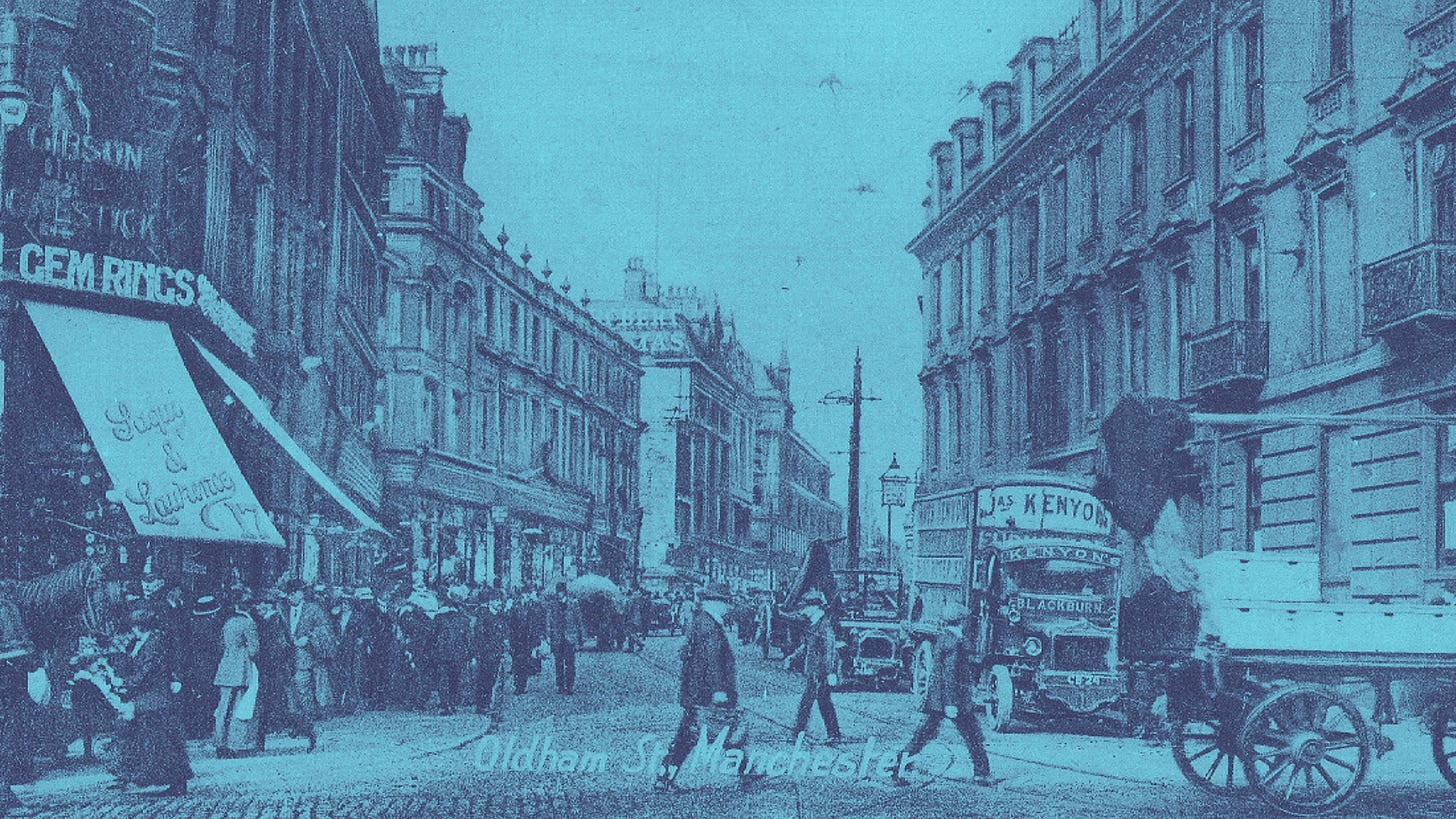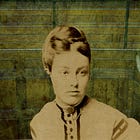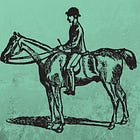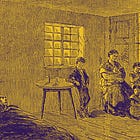The Noble Art of Hawking
Hawkers were an everyday part of Victorian city life
The smartest businessmen and women in Victorian Manchester were to be found not in the salons of King Street, but on the pavements of Shudehill.
Those streets around Smithfield Market were home to the “hawkers” who spent their days wandering the city selling everything from matchsticks to nerve tonics.
Mick Burke, who wrote a book on his recollections of growing up in Ancoats in the early years of the twentieth century, told how his mother would buy boxes of frozen rabbits, haddock and kippers from the market to sell on.
“We would break the crate open at home, pull out the rabbits, which were as stiff as concrete, and hang them over a rope line in the back kitchen to thaw out,” he wrote.
“Underneath would be sheets of brown paper to catch the blood.”
Mick’s enterprising mother would skin the rabbits and sell the skins to a fur factory to be turned into gloves and hats.
She would then go round the houses in her neighbourhood hawking the haddock and kippers.
“My mother couldn’t read or write but nobody could twist her out of a penny,” Mick said.
Old documents give an insight into the life of Manchester’s hawkers — an occupation that family historians all too regularly come across in the census records.
A writer named Benjamin Redfern wrote of coal sellers using donkeys to pull carts along the streets with weighing machines tied to the back.
“Ko-o-o-o-ul,” they shouted as they went along.
“The cry of these merchants is their most well known characteristic, and adds a great charm to our enjoyment of a foggy morning,” Redfern wrote.
Having a good niche was important for these street sellers and they soon became specialists at hawking oranges, lemons, pigs’ trotters or tripe, or fish heads left over from the market.
Others were like walking haberdashery shops, carrying thousands of needles and pins in their coat pockets.
Then there were the wood chippers who chopped up pieces of timber into tiny slivers to be sold as fire kindling.
Among the best known hawkers was old Molly Trainor, who was described by Redfern as a "fine, healthy looking old dame”.
Molly went around telling people she could tell they never “chowed” their food properly and offering them restorative bitters to aid their digestion.
"You may taste the bitters which she is sure to prescribe for you,” Redfern said.
“But don't be swindled into buying as you can get a pennyworth from the druggists or make it up for yourself.
"Molly was a decent old body when she didn't press her bitters upon me, which I always resented as being a hint from her that I was a fool,” he said.
While Molly would enjoy a friendly chat with her customers, hawking had become such a problem in Manchester by 1899 that the police forced them to keep moving all day as they plied their trade.
At one court case that year where a hawker of flowers was arrested for obstructing the highway, magistrates were told the problem caused by street sellers was now “very great indeed”.
“Not long ago,” one magistrate named Armitage said, “there were 17 hawkers standing between Tib Street and the Mosley Hotel, and they compelled passengers to walk in single file on the footpath.”
For some hawkers, even standing on street corners could be a dangerous business as one seller of oranges found out.
“Do you know what is the greatest nuisance on the earth?” a bald-headed man told a reporter from the Manchester Courier as he walked down Elizabeth Street in 1885.
“It is the street peddler,” the bald man added, revealing he had just chased one of them around the corner.
The reporter looked down and saw the bald-headed man was armed with a club.
“He has been sitting in his cart on the corner bawling out his wares all morning, howling constantly, and not permitting anybody to sleep or to think,” the man said about the hawker he had just chased away.
“The crank peddles oranges and he seems to think that every blessed orange-eater lives on Elizabeth Street,” he said.
“Perhaps I could stand it all right if he could only shout ‘oranges’ like a human being, but he shouts: ‘A-a-a-a-a-awunges’, ‘Y-a-a-a-a-wng’, ‘A-a-a-a-wn-ye!’
“And finally he gets down to just sounding in the most dismally discordant notes possible the two vowels ‘a’ and ‘y’.
“It just rolls my backbone clear up to the bump of my head.”
Just then from around the corner came a rasping, buzz-saw voice, shouting at the highest possible gait: “Orrinyes. Ni-i-i-ice, fresh ornyus!”
“A wild look came into the dancing grey eyes of the bald-headed man,” the reporter wrote.
“He seized his club firmly in both hands, swung it madly around his head, and broke out for the corner.
“The yells of the orange merchant ceased, but the bald-headed man came not back again.”
I’ve been thinking about noble art of hawking after meeting Paul on one of my tours this week. He told me his ancestor was a hawker of lemons.
It’s remarkable that the census taker who wrote down her occupation added the little extra detail of what she sold.
Lemons are an evocative thing and, if you pick one up and weigh it in your hand, you are holding the same object that Paul’s relative held in her hand and carried round the streets all those years ago.
You can almost imagine the scent of them wafting through the street.
Were any of your ancestors hawkers? It’s something to be proud of if you find one in the census.
Hawkers were incredibly resourceful people and the money they earned was often the only thing keeping them out of the workhouse.
An elderly relative once told me that my three-times great-grandmother, Ellen Kirby, hawked fish heads in Angel Meadow that people would throw into a soup.
A few weeks ago, I joined the family tradition when I went around Shudehill handing out leaflets for my Angel Meadow tours and came across an old sign on a pub door saying: “No hawking.”
I won’t tell you which pub it was — see if you can spot the sign next time you are in the area.
PS — I talked recently about Manchester family history research when I made my podcasting debut in the US.
Maureen Taylor’s Photo Detective podcast has a great following of genealogy enthusiasts across the Atlantic. You can listen to the episode here.
Hope you have a great rest of the weekend!









My paternal grandmother's family were Hawkers and dealt mainly in fish and fruit and vegetables. The hawking came down the maternal line from her gypsy great grandparents. My granddad died young, leaving my dad as the main bread winner, so after working all day, my grannie would send him with a barrow ladened with fruit and hot chestnuts, to stand outside the cinema and wait for the movie to end; he said he always wished he was inside and felt embarrassed when his friends came out of the cinema. My maternal grandmother was born and bred in Angel Meadow and sold matches as a little girl. Her parents weren't married, as her father had a wife and kids in Ancoats and times were hard for her and her mother.
My great grandmother was a Hawker in Leeds and I have her Hawkers License, I think she sold whatever she could get hold of. Both my great grandparents were gypsies.